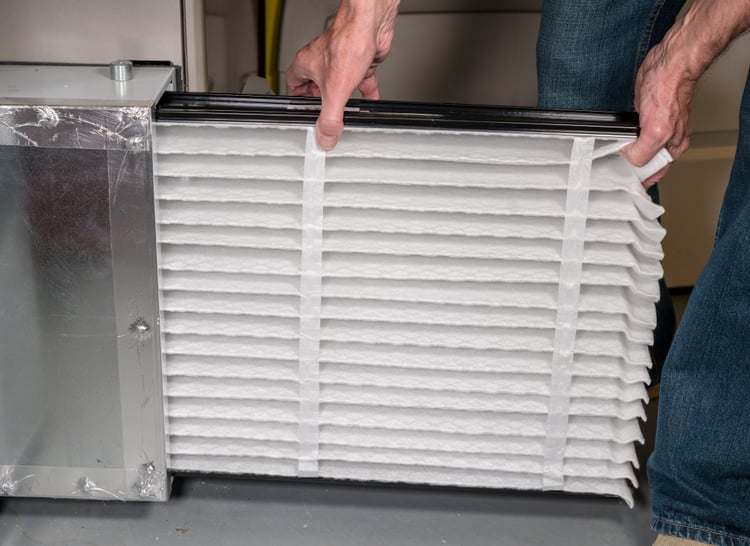Many coronavirus infections occur over short distances, when infected people sneeze or cough. However, the WHO also warned about airborne transmission over greater distances, which happens when small droplets containing the virus remain suspended in the air. ASHRAE provides many guidelines to help prevent airborne transmission of COVID-19. One of their recommendations is to use air filters with at least a MERV 13 rating or higher HEPA rating when possible. This article will briefly describe each filter classification and its applications.
The professional opinion of an HVAC engineer is strongly recommended before attempting to update any air filter. More efficient filters cause a greater pressure drop and your air handling unit may not have enough capacity, explains Ray Charles, founder of Household Air. There are three main options for improving air filtration in buildings:
- Upgrading to more efficient filters while staying within the operating capacity of your ventilation system.
- Upgrading to even greater filter efficiency, but also upgrading your ventilation system to overcome the additional pressure drop.
- Using portable air filters with high efficiency filters. They can complement HVAC filter upgrades or can be used as an alternative when an upgrade is not possible.
Air filters are not just a prevention measure against airborne pathogens. They also capture inorganic pollutants such as particulates, improving overall indoor air quality. For even better results, filtration can be combined with an air purification method such as Ultraviolet Germicidal Irradiation (UVGI). Air purification with UVGI not only kills viruses, but also bacteria and fungal spores.
Improve indoor air quality with a filter upgrade and reduce the risk of infectious diseases.
Air filtration and other indoor air quality measures for COVID-19 are intended to complement guidance provided by health authorities: social distancing, hand washing, personal protective equipment (PPE), etc. These measures cannot be forgotten, even if you have the best air filtration and disinfection systems on the market.
MERV Filters: Minimum Efficiency Reporting Value

The Minimum Efficiency Reporting Value (MERV) is an effectiveness scale for air filters developed by ASHRAE in 1987. The scale runs from 1 to 16, where a higher number indicates greater filter efficiency and ability to capture smaller particles. The following table summarizes the average retention and applications of filters across the MERV scale and the typical particle size for which they are used.
| MERV | Average Prison | Particle size range | Forms |
| 1-4 | 60-80% | >10.0 microns | Minimum filtering for:
|
| 5-8 | 80-95% | 3.0-10.0 microns |
|
| 9-12 | >90-98% | 1.0-3.0 microns |
|
| 13-16 | >95-99% | 0.30-1.0 microns |
|
A filter's MERV is determined with laboratory testing in accordance with the ASHRAE 52.2 standard. The test uses an ASHRAE-specified synthetic dust and aerosol generator, and particle counts are measured upstream and downstream of the filter. The testing procedure for the MERV rating uses 6 measurements and 12 particle sizes, resulting in a total of 72 data points.
- To help prevent coronavirus infections in buildings, ASHRAE recommends upgrading air filters in HVAC systems to at least MERV 13.
- In cases where this is not possible, portable air filters with MERV 13 or better filters can be used.
- In residential settings, ASHRAE recommends upgrading typical 1-inch filters to MERV 13 and upgrading 2-inch filters to MERV 16. However, you should double-check with an HVAC engineer before proceeding.
- When using UVGI to clean air in ducts, ASHRAE recommends using at least MERV 8 filtration to complement the disinfection system.
A filter is only effective when air is passing through. For this reason, ASHRAE recommends increasing the operating hours of ventilation systems, up to 24 hours a day, 7 days a week, if possible. More pollutants and germs are captured simply because more air passes through the filter.
HEPA Filters: High Efficiency Particulate Air

High efficiency particulate air or HEPA performs even better than MERV 16. While a MERV 16 filter captures >95% of particles across the entire test range (0.3-10.0 microns), a HEPA filter captures 99 .97% of particles are 0.3 microns in size. Filtration efficiency is even higher for particles larger or smaller than 0.3 microns. HEPA filters can capture many airborne germs and also non-living pollutants such as fine particles.
Because HEPA filters are so efficient, they cause a greater pressure drop than filters with MERV ratings. Many ventilation systems are not designed for HEPA, but these filters are available as portable air filters or vacuum cleaners.
Given their high efficiency, HEPA filters are recommended for critical healthcare applications such as anterooms, isolation wards and COVID-19 patient rooms. When schools reopen following the coronavirus outbreak, ASHRAE also recommends a portable HEPA and UV air filter for each classroom, with at least two air rotations per hour.
Conclusion
Filtration is a mechanical method of air purification, meaning it works on both living and non-living particles. HEPA filters are the most efficient for residential or commercial use, followed by MERV 13-16 filters. However, restricting the air flow of these filters causes a drop in pressure, and the capacity of the ventilation system must be considered before using them.
In cases where the ventilation system does not support a high-efficiency filter, you can use a portable air filter, upgrading to the highest MERV rating possible with the existing capacity. Alternatively, you can upgrade the ventilation system itself, making it suitable for at least MERV 13 filters.
There are many types of HVAC systems and each building is unique. To improve indoor air quality and prevent COVID-19 infections, the best starting point is an inspection by an experienced HVAC engineering company.

